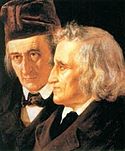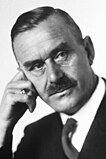जर्मन भाषा
इस लेख में सन्दर्भ या स्रोत नहीं दिया गया है। कृपया विश्वसनीय सन्दर्भ या स्रोत जोड़कर इस लेख में सुधार करें। स्रोतहीन सामग्री ज्ञानकोश के उपयुक्त नहीं है। इसे हटाया जा सकता है। साँचा:find sources mainspace |
|
| ||
|---|---|---|
| जिन देशों में प्रचलित है | जर्मनी, ऑस्ट्रिया, स्विट्ज़रलैंड, लक्सेम्बर्ग, लीश्टेनश्टाइन, फ़्रांस (अल्सेस, लोरेन), इटली (दक्षिण तिरोल), बेल्जियम (उत्तर बेल्जियम, आर्लोन), डेनमार्क (दक्षिण यूतलान्द), ब्राज़ील (रिओग्रन्देंसर हुंसरुकिश), आर्जेंटीना, मेक्सिको, परगुआय, चिली, नमिबिया, दक्षिण अफ़्रीका, पोलैंड, हंगरी, रोमानिया, स्लोवाकिया, स्लोवेनिया, चेक गणराज्य, रूस (ओब्लास्ट ओम्स्क, ओब्लास्ट सारातोव और अल्टाइ क्राइ), संयुक्त राज्य अमेरिका, कनाडा (किचनर), कज़ाखस्तान, वैटिकन शहर, क्रोएशिया, सर्बिया | |
| कुल बोलनेवाले | लगभग १४.१ करोड़ (१२ करोड़ मातृभाषा और २.१ करोड़ द्वितीय भाषा) | |
| विज्ञान वर्गीकरण |
||
| राजभाषा | जर्मनी, ऑस्ट्रिया, लीश्टेनश्टाइन, स्विट्ज़रलैंड, बेल्जियम, लक्सेम्बर्ग, इटली (दक्षिण तिरोल), यूरोपीय संघ | |
| आइएसओ 639-1: | de | |
| आइएसओ 639-2: | (B) ger | (T) deu |
| एसआइएल आइएसओ 639-3: | deu (या GER) | |
जर्मन भाषा (जर्मन: Deutsch, डॉयट्श) संख्या के अनुसार यूरोप की सब से अधिक बोली जाने वाली भाषा है। ये जर्मनी, स्विट्ज़रलैंड और ऑस्ट्रिया की मुख्य- और राजभाषा है। ये रोमन लिपि में लिखी जाती है (अतिरिक्त चिन्हों के साथ)। ये हिन्द-यूरोपीय भाषा-परिवार में जर्मनिक शाखा में आती है। अंग्रेज़ी से इसका निकटवर्ती सम्बन्ध है। किन्तु रोमन लिपि के अक्षरों का इसकी ध्वनियों के साथ मेल अंग्रेज़ी की तुलना मे कहीं बेहतर है। आधुनिक मानकीकृत जर्मन को उच्च जर्मन कहते हैं।
जर्मन भाषा भारोपीय परिवार के जर्मेनिक वर्ग की भाषा, सामान्यत: उच्च जर्मन का वह रूप है जो जर्मनी में सरकारी, शिक्षा, प्रेस आदि का माध्यम है। यह आस्ट्रिया में भी बोली जाती है। इसका उच्चारण १८९८ ई. के एक कमीशन द्वारा निश्चित है। लिपि, फ्रेंच और अंग्रेजी से मिलती-जुलती है। वर्तमान जर्मन के शब्दादि में अघात होने पर काकल्यस्पर्श है। तान (टोन) अंग्रेजी जैसी है। उच्चारण अधिक सशक्त एवं शब्दक्रम अधिक निश्चित है। दार्शनिक एवं वैज्ञानिक शब्दावली से परिपूर्ण है। शब्दराशि अनेक स्रोतों से ली गई हैं।
उच्च जर्मन, केंद्र, उत्तर एवं दक्षिण में बोली जानेवाली अपनी पश्चिमी शाखा (लो जर्मन-फ्रिजियन, अंग्रेजी) से लगभग छठी शताब्दी में अलग होने लगी थी। भाषा की दृष्टि से "प्राचीन उच्च जर्मन" (७५०-१०५०), "मध्य उच्च जर्मन" (१३५० ई. तक), "आधुनि हाई जर्मन" (१२०० ई. के आसपास से अब तक) तीन विकास चरण हैं। उच्च जर्मन की प्रमुख बोलियों में यिडिश, श्विज्टुन्श, आधुनिक प्रशन स्विस या उच्च अलेमैनिक, फ्रंकोनियन (पूर्वी और दक्षिणी), टिपृअरियन तथा साइलेसियन आदि हैं।
स्वन-विज्ञान
स्क्रिप्ट त्रुटि: "main" ऐसा कोई मॉड्यूल नहीं है।
जर्मन साहित्य
स्क्रिप्ट त्रुटि: "main" ऐसा कोई मॉड्यूल नहीं है।
| योहान वुल्फगांग फान गेटे (1749–1832) |
फ्रेडरिक शिलर (1759–1805) |
Brothers Grimm (1785–1863) |
थामस मान (1875–1955) |
फ्रेडरिक शिलर (1877–1962) |
|---|---|---|---|---|
 |
 |
 |
 |

|
संस्थाएँ
जर्मन भाषा के प्रयोग एवं पठन-पाठन को बढ़ावा देने वाले कई संस्थान हैं। इनमें से प्रमुख हैं-
- गेटे संस्थान (Goethe Institute)
- Verein Deutsche Sprache -- इसकी स्थापना १९९७ में हुई थी। जर्मन भाषा के प्रचार-प्रसार का समर्थक है। विश्व का सबसे बड़ा भाषा संघ है।
- Deutsche Welle -- जर्मन राज्य प्रसारक (ब्राडकास्टर)। बीबीसी के तुल्य। जर्मन भाषा तथा विश्व की अन्य ३० भाषाओं में (हिन्दी सहित) रेडियो और टीवी का प्रसारण करता है।
हिन्दी-जर्मन बोलचाल के वाक्य
| जर्मन वाक्य | हिन्दी वाक्य | जर्मन उच्चारण |
|---|---|---|
| ja | हाँ | "या" |
| nein | नहीं | "नाइन्" |
| bitte | कृपया (इसे करें) | "बिट्टे" |
| danke. | धन्यवाद | "डांके" |
| Bitte schön. | स्वागतम् | "बिट्टेशेन्"* |
| Kein Problem. | कोई समस्या नहीं। | "काइन् प्रोब्लेम्" |
| Entschuldigung! | क्षमा करें। | "ऐंट्शुल्डिगुंग्" |
| natürlich | वास्तव में (of course) | "नाटीर्लिख़" ** |
| richtig | सही | "रिख़्टिग्" ** |
| Vielen Dank. | आपको बहुत बहुत धन्यवाद | "फ़ीलं डांक्" |
| Nein, danke. | नहीं, धन्यवाद। | "नाइन् डांके" |
| Es tut mir leid. | मैं दुखी हूँ। | "ऐस टूट मिअ लाइड्" |
| Verzeihen Sie. | क्षमा करें। | "फ़ैर्साइअन् ज़ी" |
* इस ö और ü की सही ध्वनि हिंदी में नहीं होती हैं. ये ध्वनि ए और ई करीब है ** जर्मन "ch" का उच्चारण उर्दू का "ख़" ध्वनि करीब है
| हिन्दी वाक्य | जर्मन वाक्य |
|---|---|
| मैं थक गया हूँ। | Ich bin müde. |
| मुझे एक नौकरी की जरूरत है। | Ich brauche einen Job. |
| मैं खाना चाहता हूँ। | Ich will essen. |
| मुझे नींद आ रही हूँ। | Ich bin schläfrig. |
| मुझे खाने की जरूरत है। | Ich brauche etwas zu essen. |
| मैं आराम करना चाहता हूँ। | Ich möchte mich ausruhen. |
| मुझे भूख लगी है। | Ich bin hungrig./ Ich habe Hunger. |
| मुझे आराम करने की जरूरत है। | Ich muss mich ausruhen. |
| मुझे छोड़ना चाहते हैं। | Ich will abreisen. |
| मुझे ठंड लग रही है। | Mir ist kalt. |
| मुझे अध्ययन करने की आवश्यकता है। | Ich muss studieren. |
| मैं जाना चाहता हूँ। | Ich will gehen. |
| मुझे गर्मी लग रही है। | Mir ist heiß. |
| मुझे खत्म करने की जरूरत है। | Ich muss aufhören. |
| मैं सोना चाहता हूँ। | Ich will schlafen. |
कुछ सर्वाधिक प्रयुक्त जर्मन शब्द
| जर्मन शब्द | प्रकार | हिन्दी अर्थ | अंग्रेजी अर्थ |
|---|---|---|---|
| der / die / das | (def. art.) | -- | the; (dem. pron.) that, those; (rel. pron) who, that |
| und | (conj.) | और | and |
| sein | (verb) | हो | to be; (aux./perfect tense) |
| in | (prep.) | में | in [variation: im in the] |
| ein | (indef. art.) | एक | a, an; (pron.) one (of) |
| zu | (prep.) | करने के लिए | to, at; (adv.) too |
| haben | (verb) | है | to have; (aux./perfect tense) |
| ich | (pers. pron.) | मैं | I |
| werden | (verb) | हो | to become; (aux./future tense); (aux./passive voice) |
| sie | (pron.) | वे | she, her; they, them; Sie (pron.) you (formal) |
| von | (prep.) | द्वारा | from, of |
| nicht | (adv.) | नहीं | not |
| mit | (prep.) | के साथ | with |
| es | (pron.) | यह | it |
| sich | (refl. pron.) | स्थित | -self |
| auch | (adv.) | भी | also, too |
| auf | (prep.) | पर | on, at, in |
| für | (prep.) | के लिए | for |
| an | (prep.) | पर | at, on [variation: am at/on the] |
| er | (pron.) | वह | he |
| so | (adv.) | तो | so; thus, this way, such |
| dass | (conj.) | कि | that |
| können | (verb) | कर सकते हैं | can, to be able |
| dies | (pron.) | यह | this, that |
| als | (conj.) | के रूप में | as, when; (adv.) than |
| ihr | (pron.) | उसकी | you, her; (poss. adj.) her, their, hers, theirs; Ihr (poss. adj.) your (formal) |
| ja | (adv.) | हाँ | yes; certainly, really |
| wie | (adv.) | की तरह | how; as |
| bei | (prep.) | पर | by, with, at |
| oder | (conj.) | या | or |
| wir | (pron.) | हम | we |
| aber | (conj.) | लेकिन | but; (adv./flavoring particle) |
| dann | (adv.) | तब | then |
| man | (pron.) | एक | one, you |
| da | (adv.) | दा | there; (conj.) because |
| sein | (poss. adj.) | हो | his, its |
| noch | (adv.) | अभी तक | still, yet |
| nach | (prep.) | के बाद | after, toward |
| was | (pron.) | क्या | what |
| also | (adv.) | तो | so, therefore |
| aus | (prep.) | से | out, out of, from |
| all | (pron.) | सभी | all |
| wenn | (conj.) | अगर | if, when |
| nur | (adv.) | केवल | only |
| müssen | (verb) | करना होगा | to have to, must |
| sagen | (verb) | कहते हैं कि | to say |
| um | (prep.) | करने के लिए | around, at [variation: um ... zu in order to] |
| über | (prep.) | के बारे में | above, over, about |
| machen | (verb) | बनाना | to do, make |
| kein | (pron.) | नहीं | no, not a/an |
| Jahr das, -e | (noun) | वर्ष कि ई | year |
| du | (pron.) | तुम | you |
| mein | (poss. adj.) | मतलब | my |
| schon | (adv.) | पहले से ही | already; (adv./flavoring particle) |
| vor | (prep.) | से पहले | in front of, before, ago |
| durch | (prep.) | द्वारा | through |
| geben | (verb) | देने के लिए | to give |
| mehr | (adv.) | अधिक | more |
| andere, anderer, anderes | (adj./pron.) | अन्य, अन्य, अन्य | other |
| viel | (adj./pron.) | ढेर सारा | much, a lot, many |
| kommen | (verb) | आओ | to come |
| jetzt | (adv.) | अब | now |
| sollen | (verb) | चाहिए | should, ought to |
| mir | (pron.) | मुझे | me |
| wollen | (verb) | इच्छा है | to want |
| ganz | (adj.) | पूर्ण | whole, all the; (adv.) quite |
| mich | (pron.) | मुझे | me |
| immer | (adv.) | हमेशा | always |
| gehen | (verb) | जाओ | to go |
| sehr | (adv.) | बहुत सारा | very |
| hier | (adv) | यहाँ | here |
| doch | (adv.) | लेकिन | however, still; (adv./flavoring particle) |
| bis | (prep./conj.) | जब तक | until |
| groß | (adj.) | बड़े | big, large, great |
| wieder | (adv.) | फिर से | again |
| Mal das, -e | (noun) | कि ई बार | time; mal (conj.) times [math]; (adv.) time(s); once; just |
| zwei | (num.) | दो | two |
| gut | (adj.) | अच्छी तरह से | good |
| wissen | (verb) | पता है | to know |
| neu | (adj.) | नई | new |
| sehen | (verb) | देखें | to see |
| lassen | (verb) | चलो | to let, allow, have (something) done |
| uns | (pron.) | हमें | us |
| weil | (conj.) | क्योंकि | because |
| unter | (prep.) | के अंतर्गत | under |
| denn | (conj.) | क्योंकि | because; (adv./flavoring particle) |
| stehen | (verb) | खड़े हो जाओ | to stand |
| jede, jeder, jedes | (art./pron.) | प्रत्येक, हर, हर | every, each |
| Beispiel, das, -e | (noun) | उदाहरण के लिए, कि ई | example |
| Zeit, die | (noun) | समय, | time |
| erste, erster, erstes | (adj.) | प्रथम, प्रथम, पहला | first |
| ihm | (pron.) | उसे | him, it |
| ihn | (pron.) | उसे | him |
| wo | (adv.) | जहाँ | where |
| lang | (adj.) | लंबी | long; lange (adv.) for a long time |
| eigentlich | (adv.) | असल में | actually; (adj.) actual, real |
| damit | (adv.) | इस प्रकार | with it; (conj.) so that |
| selbst, selber | (pron.) | अपने आप को, अपने आप को | -self; (adv.) even |
| unser | (poss. adj.) | हमारे | our |
| oben | (adv.) | शीर्ष | above, up there |
इन्हें भी देखें
- आस्ट्रियन साहित्य
- गेटे संस्थान (Goethe Institute)
बाहरी कड़ियाँ
- हिन्दी --> जर्मन शब्दकोश
- जर्मन --> हिन्दी शब्दकोश
- हिन्दी-जर्मन शब्दकोष
- हिन्दी-जर्मन शब्दावली
- हिन्दी माध्यम से जर्मन भाषा सीखें
- जर्मन भाषा सीखेंसाँचा:category handlerसाँचा:main otherसाँचा:main other[dead link] (DW)
- The Goethe Institute: German Government sponsored organisation for the promotion of the German language and culture.
- Free German Language Course
- Deutsche Welle German courses
- German Pronouns: Nominative Case, German Pronouns: Accusative Case
- Free Online German Lessons
- The Leo Dictionaries: A German language portal featuring German-English, German-French, German-Spanish, German-Italian and German-Chinese dictionaries, with forums and a search function
- Online German Course: A free online German course for absolute beginners.
